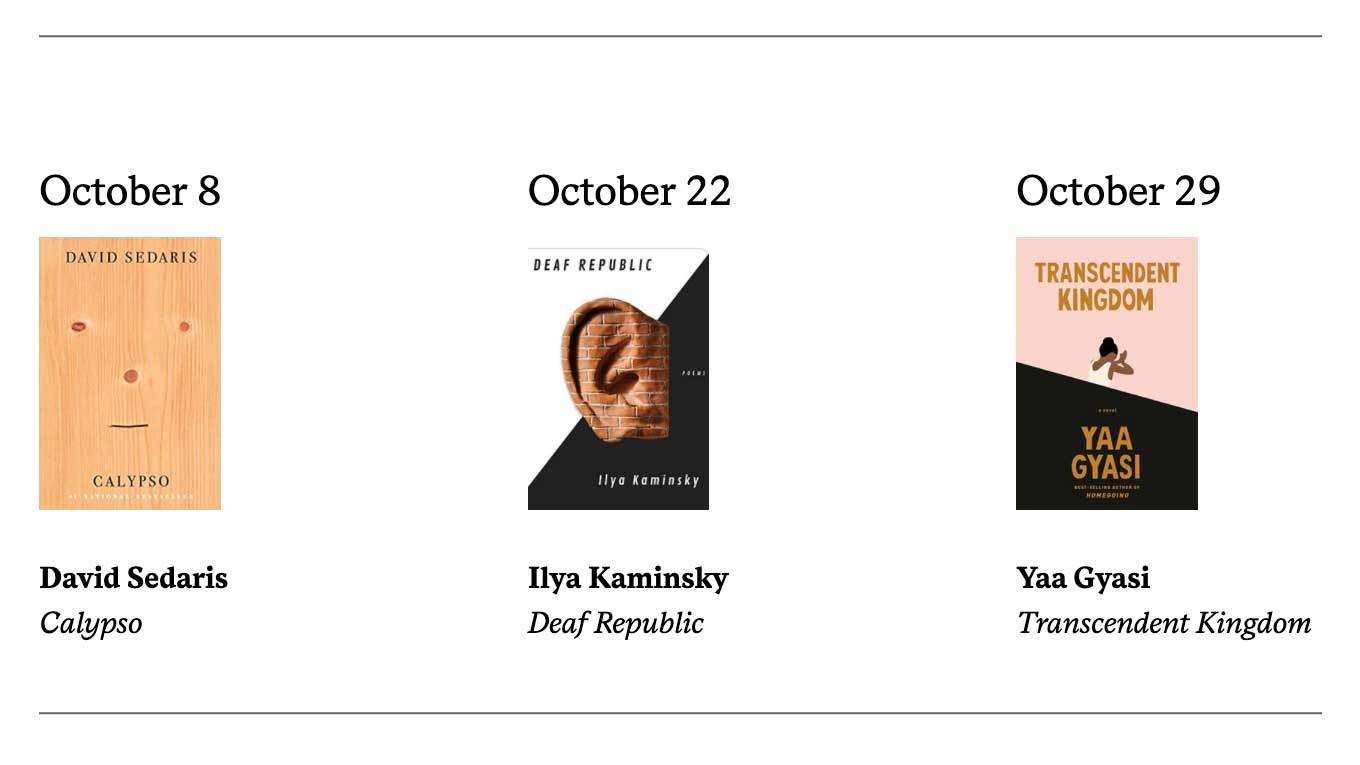Living Writers proved during the month of October that powerful writing extends beyond genre limitations. Students, faculty and staff members, alumni, parents, and Hamilton residents laughed at David Sedaris’ nonfiction essay collection, cried about state violence in Ilya Kaminsky’s gripping poetry collection, and wrestled with Yaa Gyasi’s depiction of addiction and mental illness in her novel.
The beloved course that introduces the Colgate community to contemporary authors brought Sedaris to Zoom screens on Oct. 8 to discuss themes around his most recent book, Calypso. It was his first public engagement since the pandemic started, and for someone who spends months of each year on book tour, it marked a welcome change.
“I hate not being on tour. I wonder if it's possible to die from a lack of attention,” Sedaris said.
Sedaris read “Standing By,” an essay published in the New Yorker on the time he spends in airports and how these spaces allow humans to reveal their “gloriously hateful” selves. Political, heartfelt, and laugh-out-loud funny, the reading segued into a Q&A session with four hosts: Jennifer Brice, associate professor of English and Living Writers director; Assistant Professor of English CJ Hauser; Carina Haden ’21; and Tommy Williams ’21. They asked, among other things, about the intimate (and sometimes brutal) portrayals of family that color Calypso.
“People don't think you love your subjects unless you are sentimental about them,” Sedaris said. “I think I've always been able to separate those two things. In the family I come from, loving someone means making merciless fun of them and you don’t have to say ‘I was just kidding’ at the end.”
Kaminsky was similarly shaped by his upbringing, one that saw the deaf poet emigrate from the former Soviet Union to the United States. Deaf Republic is bookended by two poems that depict ambivalence toward police killings in America today before moving to poems about an imagined Eastern European town facing military occupation. The townspeople protest by feigning deafness and refusing to hear the soldiers, allowing silence and language to play key roles in the image-rich story.
“I grew up not hearing Russian or English; I grew up lipreading,” Kaminsky said. “I could lipread my parents on the porch, but at the same time there would be two pigeons on the balcony. There would be cars passing by. All of that was a part of the story on the lips of my parents, which had nothing to do with what they said and yet everything to do with how I perceived what they were saying.”
Characters like a beloved newlywed couple with their first child or a woman running a puppet theater where soldiers disappear make public suffering a personal experience, bringing readers along on a shared, intimate journey.
“Great poets, unlike politicians, unlike great public speakers or performers and so forth, are very private people,” he said. “Great poets are private people who happen to write so well, so beautifully, so strangely, so spellbindingly, so unexpectedly that they can cast a spell on you and thereby speak privately to many people at the same time.”
Gyasi was also concerned with private lives in Transcendent Kingdom as she depicted Gifty, a Ghanaian-American completing neuroscience research on reward-seeking behavior in order to grapple with her brother’s fatal heroin addiction and mother’s subsequent depression.
“I was building this story around these two psychiatric illnesses that exist on this spectrum,” Gyasi said. “Addiction being the part of reward-seeking where a mouse or a human continues to seek reward even when there’s great risk involved and depression being when the mouse cannot seek pleasure even when there’s great gain to be had.”
The story moves between Gifty’s childhood and an adulthood spent both taking care of her mother and completing PhD research. Scenes depict a summer in Ghana, her Pentecostal church in Alabama, and her research lab at Stanford. Explorations of faith and science, racism and community, and grief and shame are woven throughout these scenes in Gifty’s life.
“I always want my books to read the way a life feels,” Gyasi said. “I recognize that we’re always bringing to bear all of these multiple parts of ourselves with how we interact with the present.”
Learn more about the final author visits at colgate.edu/livingwriters.
